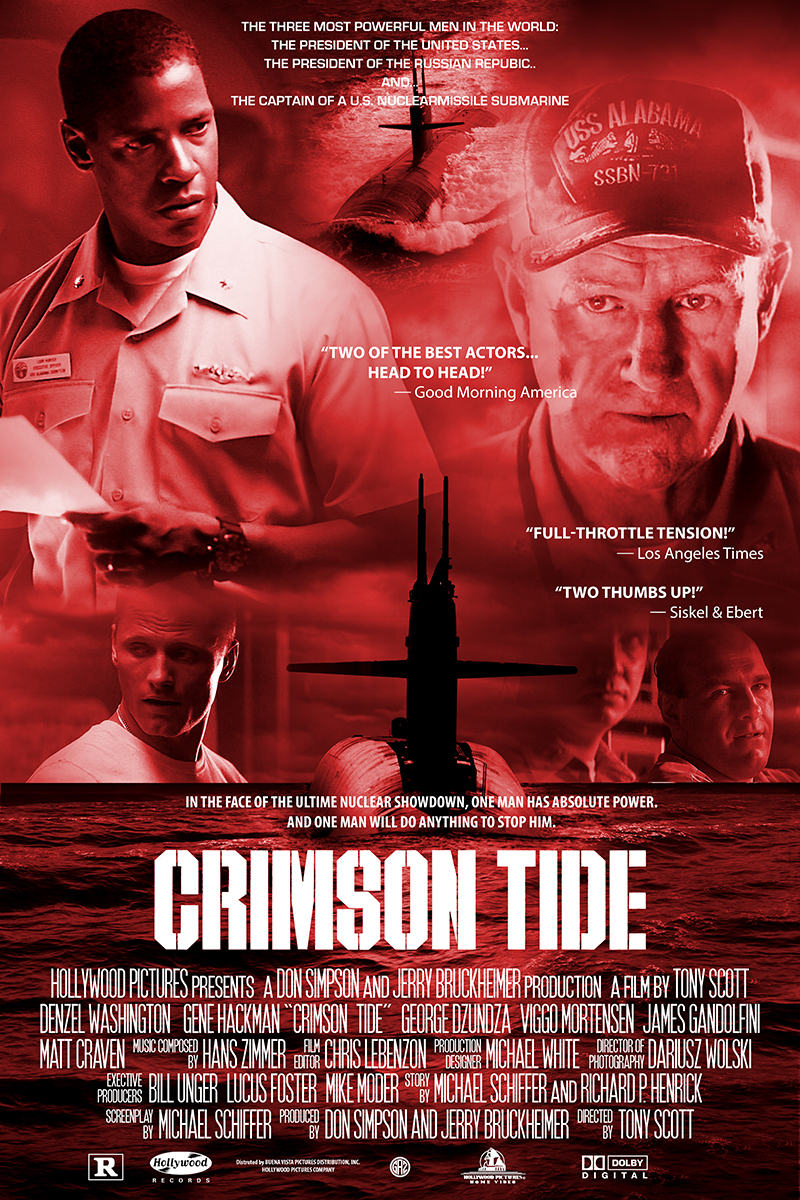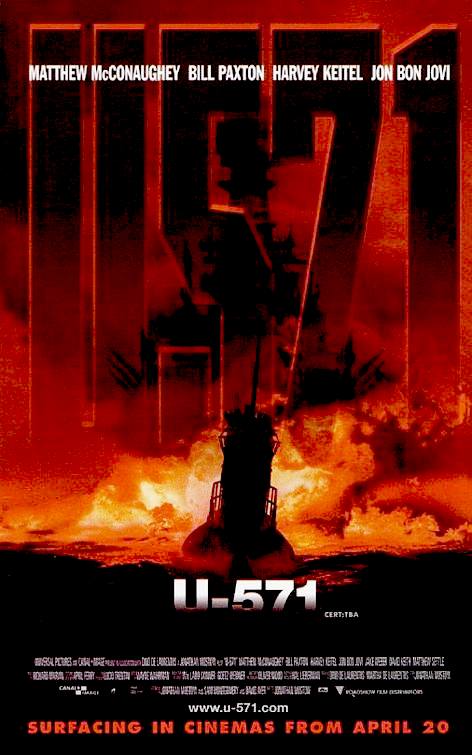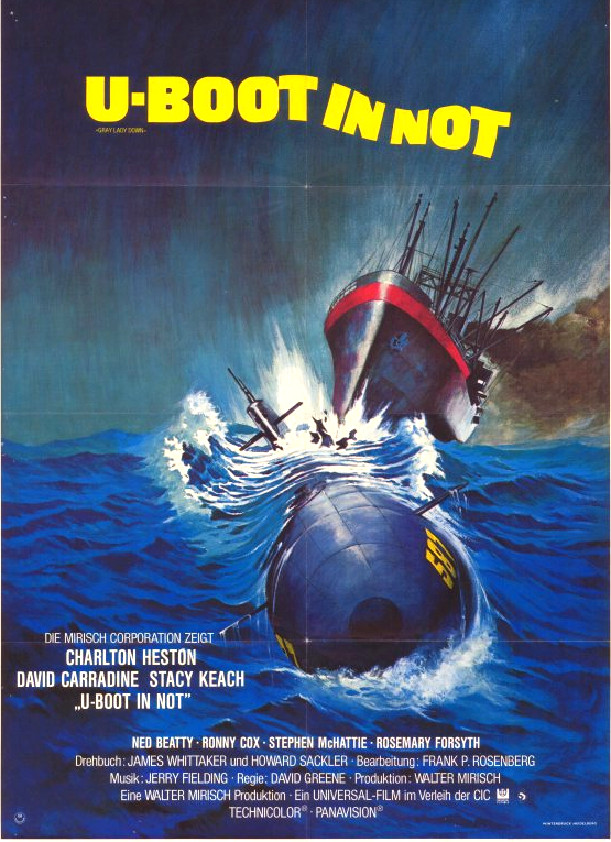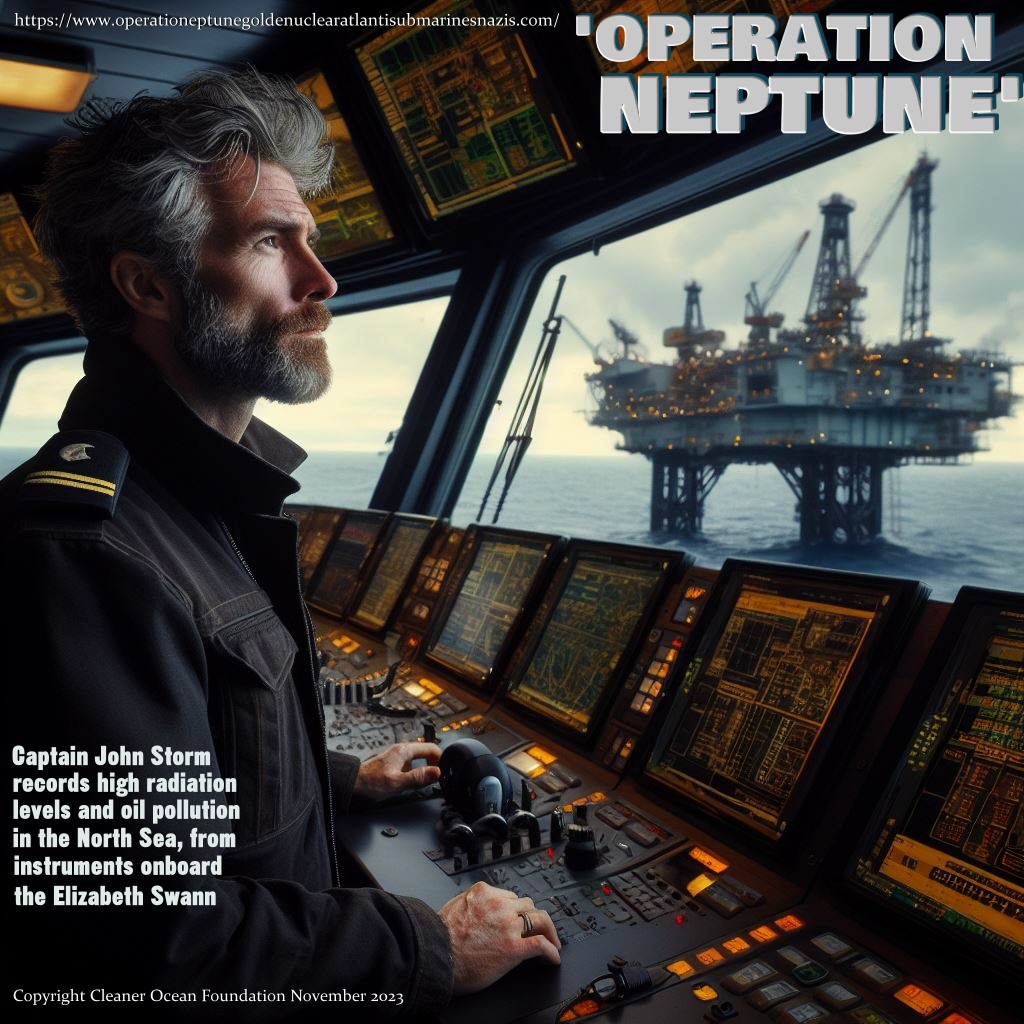|

CRIMSON
TIDE - Crimson Tide is a 1995 American
action thriller film directed by Tony Scott and produced by Don Simpson
and Jerry Bruckheimer. It takes place during a period of
political turmoil in Russia, in which ultranationalists threaten to
launch nuclear missiles at the United States and Japan.
The film focuses on a clash of wills
between the seasoned commanding officer of a U.S. nuclear missile
submarine (Gene Hackman) and his new executive officer (Denzel
Washington), arising from conflicting interpretations of an order to
launch their missiles. The story parallels a real incident during the
Cuban Missile Crisis.
Hans Zimmer, who scored the film, won a
Grammy Award for the main theme, which heavily uses synthesizers instead
of traditional orchestral instruments. An extended cut, which
incorporates seven minutes of deleted scenes, was released on DVD in
2006, while the 2008 Blu-ray release only includes the theatrical version.
Crimson
Tide is a 1995 American "what if" action thriller film directed by Tony
Scott and produced by Don Simpson and Jerry Bruckheimer. It takes place
during a period of political turmoil in Russia, in which
ultranationalists threaten to launch nuclear missiles at the United
States of America and Japan.
The film focuses on a clash of wills between the
seasoned commanding officer of a U.S. nuclear missile submarine (Gene
Hackman) and his new executive officer (Denzel Washington), arising from
conflicting interpretations of an order to launch their missiles. The
story parallels a real incident during the Cuban Missile Crisis.
Hans Zimmer, who scored the film, won a Grammy Award
for the main theme, which heavily uses synthesizers instead of
traditional orchestral instruments. An extended cut, which incorporates
seven minutes of deleted scenes, was released on DVD in 2006, while the
2008 Blu-ray release only includes the theatrical version.
PLOT
An opening title card lists the three most powerful
people on the planet: The U.S. President, the Russian President, and the
captain of a U.S. nuclear submarine.
In post-Soviet Russia, civil war erupts as a result of
the ongoing conflict in Chechnya. Military units loyal to Vladimir
Radchenko, a Russian ultra-nationalist rebel, take control of a nuclear
missile installation and threaten nuclear war if confronted.
USS Alabama, a U.S. Navy ballistic missile submarine,
is dispatched on patrol with orders to launch a pre-emptive nuclear
strike if Radchenko fuels his missiles. Combat-hardened veteran Captain
Frank Ramsey is in command and chooses Lieutenant Commander Ron Hunter,
who has an extensive education in military history and tactics but no
combat experience, as his new XO.
Tensions arise between the headstrong Ramsey and the
more analytical and cautious Hunter, exacerbated by Ramsey's decision to
order a missile drill amidst the chaos caused by a galley fire that
results in the death of the chief mess officer. Hunter helps fight the
fire and discreetly questions the decision but is chastised by Ramsey
for the appearance of discord.
Alabama receives an Emergency Action Message ordering
missile launch against the Russian base. As Alabama prepares to fire, a
second radio message is detected before a rebel Russian Akula-class
submarine attacks, damaging the ship's radio and leaving the message
incomplete.
With the last confirmed order being to launch, Ramsey
decides to proceed. Hunter disagrees, believing the partial second
message may be a retraction. When Hunter refuses to consent as is
required, Ramsey tries to relieve him of duty. Hunter orders Ramsey
arrested for attempting to circumvent two-man protocol. The crew's
loyalty is divided between Hunter and Ramsey, but the Chief of the Boat
sides with Hunter and has Ramsey relieved of command and confined to his
stateroom, putting Hunter in charge.
The Russian submarine attacks Alabama again. The
American vessel emerges victorious but is hit by a torpedo. The main
propulsion system is disabled and the bilge bay begins flooding. As the
crew tries to restore propulsion, Hunter orders the sealing of the bilge
with sailors trapped inside, saving the ship at the expense of the men.
Just before the submarine reaches hull-crush depth, propulsion is
restored.
Officers and crew loyal to Ramsey unite and retake the
control room, confining Hunter, the Chief of the Boat, and a few others
to the officers' mess. Repairs to the radio continue, but Ramsey is
determined to proceed without waiting for verification. Hunter escapes
his arrest and stages a second mutiny. He gains the support of weapons
officer Peter Ince in the missile control room, further delaying the
launch and leading Ramsey to proceed to missile control. Hunter's party
storms the ship's command center, removing the captain's missile key.
Ramsey and his men return, resulting in an armed Mexican standoff. With
news that the radio will soon be repaired, Ramsey and Hunter agree to
wait until the deadline for a preemptive missile launch to be effective.
As they wait, Ramsey asks Hunter, who is African
American, if he knows of the Lipizzan stallions, famed for their
training and ability, pointing out that they are all white from Portugal. Hunter points out in response that they are born black and are
from Spain. Ramsey acknowledges he didn't know about the birth color,
but he was firm in the belief where they were from. Communications are
restored, revealing the full message from the second transmission – a
retraction ordering that the missile launch be aborted because
Radchenko's rebellion has been quelled. Ramsey turns the conn over to
Hunter and returns to his cabin.
The two men are put before a tribunal at Naval Station
Pearl Harbor to answer for their actions. The tribunal concludes that
both men were right and both men were wrong, and Hunter's actions were
deemed lawfully justified and in the best interests of the United
States. Unofficially, the tribunal reprimands both men for failing to
resolve their differences. Thanks to Ramsey's personal recommendation,
the tribunal agrees to grant Hunter command of his own sub while
allowing Ramsey to save face via an early retirement with full honors.
Outside, Hunter meets with Ramsey to express his gratitude, while Ramsey
admits to Hunter he was right about the Lipizzan stallions being from Spain, as the two men part ways amicably.
A closing title card states that as of January 1996,
authority to launch nuclear missiles is no longer within the power of a
U.S. nuclear submarine captain, but rather the President of the United
States.
PRODUCTION
In 1993 the United States Navy allowed studio
executives researching the movie to embark aboard Trident submarine USS
Florida from Bangor, Washington, with the Gold Crew. Those embarked
included Hollywood Pictures president of production Ricardo Mestres,
director Tony Scott, producers Jerry Bruckheimer and Don Simpson,
screenwriter Michael Schiffer, and writer Richard Henrick. While aboard,
the Navy allowed the film crew to videotape Florida's Executive
Officer, Lieutenant Commander William Toti, performing many of the same
actions (Executive Officer's response to fire, flooding, missile launch
sequence, etc.) that actor Denzel Washington eventually performed as
executive officer in the movie.
The Navy had been led to believe that the movie's
storyline was going to be about a Trident ballistic missile submarine
crew attempting to stop the ship's fictional computer from launching
nuclear missiles and starting World War
III. In movie parlance, the Navy was told the story would be "The Hunt for Red October meets 2001:
A Space
Odyssey." The Navy wanted the Florida crew to
prove to the studio executives that "there is no computer on a Trident
submarine that can launch missiles, hence the storyline is implausible.
Following the at-sea walk-through and missile launch
demonstration, Florida returned to port to drop off the studio
executives. During that transit, Toti spent a great deal of time in the
ship's wardroom with the studio executives, walking them through the
missile launch redundancy procedures. A few months later, the studio
returned to the Navy with the revised storyline, and the Executive
Officer, Lieutenant Commander Hunter (the character played by Denzel
Washington) was now leading a mutiny against the commanding officer to
prevent a missile launch.
The film has uncredited additional writing by Quentin
Tarantino, much of it being the pop-culture-reference laden dialogue.
Tarantino had an on-set feud with Denzel Washington during filming over
what was called "Tarantino's racist dialogue added to the script". A few
years later, Washington apologized to Tarantino saying he "buried that
hatchet".

U-571,
DINO DE LAURENTIS 2000 - The film was directed by Jonathan
Mostow,
starring
Matthew McConaughey,
Bill Paxton, Harvey Keitel, Thomas Kretschmann, Jon Bon Jovi, Jack Noseworthy, Will Estes and Tom
Guiry. In the film, a World War II German submarine is
boarded in 1942 by disguised United States Navy submariners seeking to
capture her Enigma cipher machine.
The film was financially successful and
generally well-received by critics in the USA and won an Academy Award
for sound editing. The fictitious plot attracted substantial criticism
since, in reality, it was British personnel from HMS Bulldog who first
captured a naval Enigma machine (from U-110 in the North Atlantic in May
1941), months before the United States had even entered the war. The
anger over the inaccuracies even reached the British Parliament, where
Prime Minister
Tony Blair
stated that the film was an "affront" to British sailors.
CAST
- Denzel Washington as Lieutenant Commander Ron Hunter, Executive Officer (XO)
- Gene Hackman as Captain Frank Ramsey, Commanding Officer (CO)
- George Dzundza as Chief of the Boat Walters (COB)
- Matt Craven as Lieutenant Roy Zimmer, Communications Officer
(COMMO)
- Viggo Mortensen as Lieutenant Peter Ince, Weapons Officer
(WEPS)
- James Gandolfini as Lieutenant Bobby Dougherty, Supply Officer
(SUPPO)
- Rocky Carroll as Lieutenant Darik Westergard, Operations Officer (OPS)
- Jaime P. Gomez as Officer of the Deck Mahoney (OOD)
- Michael Milhoan as Chief of the Watch Hunsicker (CPOOW)
- Scott Burkholder as Tactical Supervising Officer Billy Linkletter
(TSO)
- Danny Nucci as Petty Officer Danny Rivetti, Sonar Supervisor
- Lillo Brancato, Jr. as Petty Officer Third Class Russell
Vossler, Radio Operator
- Rick Schroder as Lieutenant Paul Hellerman, Damage Control Officer
- Steve Zahn as Seaman William Barnes
- Mark Christopher Lawrence as Leading Culinary Specialist Rono
- Ryan Phillippe as Seaman Grattam
- Eric Bruskotter as Bennefield
- Daniel von Bargen as Vladimir Radchenko, Russian ultra-nationalist leader
- Jason Robards as Rear Admiral Anderson (uncredited)
- Jim Reid Boyce as Diving Officer

FILMING
Filming took place in 1994. In the end, the Navy
objected to many of the elements in the script - particularly mutiny on
board a U.S. naval vessel - and as such, the film was produced without
the Navy's assistance. The French Navy assisted the team for production
with the use of the aircraft carrier
Foch. The dockside scene in which Captain Ramsey
addresses the crew with Alabama in the background and the crew then runs
on board actually features USS
Barbel. The sail ("conning tower") was a plywood
mock-up since Barbel's sail had been removed. Barbel had been sold by
the U.S. Navy and was in the process of being scrapped.
Because of the Navy's refusal to cooperate with the
filming, the production company was unable to secure footage of a
submarine submerging. After checking to make sure there was no law
against filming naval vessels, the producers waited at the submarine
base at Pearl Harbor until a submarine put to sea. After a submarine
(coincidentally, the real
USS
Alabama) left port, they pursued it in a boat and
helicopter, filming as they went. They continued to do so until she
submerged, giving them the footage they needed to incorporate into the
film.
BOX OFFICE AND CRITICS
Crimson Tide earned $18.6 million in the United States
on its opening weekend, which ranked #1 for all films released that
week. Overall, it earned $91 million in the U.S. and an additional $66
million internationally, for a total of $157.3 million. Against a budget
of $53 million.
Not a bad return. Inside Man did better. With most
Denzel
Washington films making bankable returns. Though,
difficult to
compete with Marvel comic releases, or Avatar, where
consumers
seem to prefer total escapism, suspending disbelief
from the
word go.
The film received mostly positive reviews from
critics. Review aggregator Rotten Tomatoes reports that 89% of 53
critics have given the film a positive review, with a rating average of
7.5/10. The consensus reads, "Boasting taut, high energy thrills and
some cracking dialogue courtesy of
(an uncredited) Quentin
Tarantino, Crimson Tide finds
director Tony Scott near the top of his action game." Audiences polled
by CinemaScore gave the film an average grade of "A" on an A+ to F
scale.
Roger Ebert of the Chicago Sun-Times wrote, "This is
the rare kind of war movie that not only thrills people while they're
watching it, but invites them to leave the theater actually discussing
the issues," and ultimately gave the film three-and-a-half stars out of
four. Meanwhile, Mick LaSalle of the San Francisco Chronicle wrote,
"Crimson Tide has everything you could want from an action thriller and a
few other things you usually can't hope to expect."
Owen Gleiberman of Entertainment Weekly wrote that,
"what makes Crimson Tide a riveting pop drama is the way the conflict
comes to the fore in the battle between two men. ... The end of the
world may be around the corner, but what holds us is the sight of two
superlatively fierce actors working at the top of their game."
We would agree with all three critics. Stunning
performances by Denzel and Gene, with
terrific support from other cast members. Another Hollywood
great. The
direction is as usual superb from Tony
Scott, who really knows how to build up tension, to
keep the
audience on the edge of their seats, great script and
superb
casting. The dialogue was what one might expect in the
circumstances. Quentin is famous for cutting to the pop sparkle quick,
and Denzel is a shining beacon of fair play, reliability and quality
performances, as in many other films
(Unstopable [2010], Man on Fire [2004], Déjà Vu [2006]
and The Taking of Pelham 123 [2009]).
Overall, one of the best submarine films made to date.
It is
the benchmark submarine movie for the applicable
scenes in Operation
Neptune.

WWIII3
Cyber Nuclear Holocaust is an original John Storm political thriller
SUBMARINE
FILMS
A - Z
20,000
LEAGUES UNDER THE SEA - JULES
VERNE, WALT
DISNEY, KIRK DOUGLAS, JAMES MASON
AGENT
S-03 OPERATION ATLANTIS, 1965 ITALIAN EURO SPY-FI, JOHN
ERICSON
AQUAMAN
- JASON MOMOA - WARNER BROS. DC STUDIOS 2018
ATLANTIS:
THE LEGEND BEGINS (BBC) NETWORK TV SERIES 2013
ATLANTIS:
THE LOST CITY
OF
ATLANTIS:
THE LOST CONTINENT - MGM 1961
ATLANTIS:
THE LOST EMPIRE, 2001 LIVE ACTION FANTASY, DISNEY
BEAR
ISLAND: ALISTAIR MACLEAN 1979 THRILLER, ARCTIC HUNT FOR NAZI U-BOAT
GOLD
CLASSIC
WWII & COLD WAR, BEST
SUBMARINE MOVIES
CRIMSON
TIDE - 1995, DENZEL WASHINGTON, GENE HACKMAN, BUENA VISTA
DEEPWATER
HORIZON - BP OIL SPILL DISASTER BIOPIC 2016
GRAY
LADY DOWN - 1978 SUBMARINE DEEP SEA RESCUE DRAMA, CHARLTON
HESTON
HUNTER
KILLER - 2018, GERARD BUTLER, GARY OLDMAN 2018
ICE
STATION ZEBRA - ALISTAIR MACLEAN SUBMARINE ARCTIC THRILLER
1968 ROCK HUDSON, MGM
K19
- THE
WIDOWMAKER, HARRISON FORD & LIAM NEESON, 2002,
PARAMOUNT NAT. GEOGRAPHIC
LAW
ABIDING CITIZEN - 2009 VIGILANTE ACTION THRILLER, GERARD
BUTLER, JAMIE FOX
NORTH
SEA HIJACK: ROGER MOORE, JAMES MASON 1980 ADVENTURE, CINEMA
SEVEN & UNIVERSAL
THE
HUNT FOR RED OCTOBER - 1990 US SPY THRILLER (SEAN CONNERY,
ALEC BALDWIN) PARAMOUNT
THE
SPY WHO LOVED ME - 1977, ROGER MOORE AS JAMES BOND 007,
ALBERT R BROCCOLI
U571
- WWII U-BOAT SUBMARINE DRAMA, THE CAPTURE OF THE ENIGMA
DECODING MACHINE
PICTURES
A - Z
1. Crimson Tide (1995) - 116 min | Action, Drama, Thriller
2. The Sum of All Fears (2002) - 124 min | Action, Drama, Thriller
3. Planet of the Apes (1968) - 112 min | Adventure, Sci-Fi
4. Terminator 2: Judgment Day (1991) - 137 min | Action, Adventure,
Sci-Fi
5. Mission: Impossible - Fallout (2018)
6. Dr. Strangelove or: How I Learned to Stop Worrying and Love the
Bomb (1964) - 95 min | Comedy, War
7. Unthinkable (2010) - 18 | 97 min | Crime, Drama, Thriller
8.
Tomorrow
Never Dies (1997) - 119 min | Spy, Action, Thriller
9.
Goldfinger
(1964) - Blockbuster | Spy, Action
10.
Lord
of War (2005) - Crime | Drama
11.
War
Games - (1983) - Techno-Thriller
12.
Olympus
Has Fallen (2013) - Political, Thriller
13.
White House Down (2013) - Political, Thriller
14.
Die Hard 4 (2007) Cyber, Action, Thriller [Live Free or Die Hard]
15.
SALT, (2010) - Spy, Action, Thriller
16.
From
Russia With Love - (1963) Blockbuster | Spy, action
CHAPTERS
| CHARACTERS
| MEDIA
|
MOVIE REF |
SCREENPLAY
|


